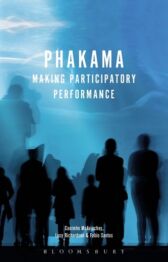Synopsis
Phakama - Making Participatory Performance
Caoimhe McAvinchey & Fabio Santos & Lucy Richardson
Published by Methuen
With contributions from participants, artists, academics and cultural commentators from India, Ireland, South Africa, the UK and USA, this book features case studies, interviews and articles covering two decades of practice
At the heart of the book is a selection of carefully explained and beautifully illustrated exercises which will enable Phakama's methodology to be used by organisations and practitioners working with young people internationally
Phakama is a Xhosa and Zulu word for stand up, arise, empower yourself
With a focus on collaborative, non-hierarchical performance making, Phakama invites cultural sharing and critical engagement with the world we live in
As well as engaging with political and critical concerns about contemporary theatre and performance, the book offers unique approaches to devising theatre, applied and social theatre, intercultural performance practices and pedagogic models of collaboration and cultural leadership
TABLE OF CONTENTS
Acknowledgements
Contributors
List of Illustrations
Forward by Mandla Mbothwe
INTRODUCTION
Phakama Projects (1996-2006)
Timeline
PART ONE: PREPARING THE GROUND
Introduction to Preparing the Ground
Hosting
Introduction
Phakama Practice: Cultural Tours
Phakama Practice: Cultural Tours How To
The Practical Politics of Care
Case Study: The Child I Curry (Lesotho, 2003) by Selloane Mokuku
Give and Gain
Introduction
Phakama Practice: Give and Gain
Phakama Practice: Give and Gain How To
Cultural Contexts: South Africa and Ubuntu, Progressive Education
Case Study: Bulang Dikgoro/ Open the Gates (South Africa, 1996 1997) by Tony Fegan.
Interview: 'Give and Gain: Twenty Years Later' with Mildrett Stevens, Tracey Ligate and Sharon Waverly (Phakama South Africa)
Cultural Sharing
Introduction: Working Together
Phakama Practice: Mapping the World
Phakama Practice: Mapping the World How To
Difficult Cooperation
Case Study: Be Yourself (Phakama SA and Phakama UK, Tricycle Theatre, London, 1999) by Caroline Calburn
Interview with Maylene Catchpole (Phakama UK)
Essay: 'When Time Is Not (2008) : Artistic Exchange between Project Phakama UK and the Creative Arts Team (New York City)' by Ananda Breed
PART TWO: MAKING THE PERFORMANCE
Introduction to Making the Performance
Layered Co-Authorship
Working with Site and Found Materials
Hosting The Audience
Interview with James Hadley, Phakama Relationship Manager, Arts Council England (2008-2014).
Essay: 'Catalytic Conversations: The aesthetic weave and social weft of Phakama's creative practice' by Sara Matchett
Case Study: The Phakama Way, Pune, India (2002) by Vidyanidhee Vanarese
The Street Is My Backyard, Buenos Aires, Argentina (1996), Charlotte Higgins, The Guardian, Monday 17 April 2006
PART THREE: CELEBRATION
Introduction to Celebration
Connecting
Introduction
Case Study: The Edible Garden (UK, 2012-2016) by Corinne Micallef
Being
Introduction
Essay: 'Alive to the Music of What's Happening'by Lucy Neal
Stepping Up
Introduction
Interviews with:
Jake Boston
Sam Quinn
Juancho Gonzalez
Cedoux Kadima
Liesl Hartman
Jean September
Alpha Thiam
Beverley Randall
Clinton Osborne and Mpotseng Shuping
Luvuyo Mabuto and Craig Koopman
Introduction to 'Performing Risk'
Essay: 'Performing Risk' by Shirley Brice Heath.
EPILOGUE
INDEX
REVIEWS
"Phakama has been on a long journey of discovery and creating a space for people to belong. It has and will continue to be a crucial part of many people's lives because governments around the world continue to make life unliveable so sanctuary has to be sought. Phakama holds a million stories and the unpacking of these narratives and exploration of methodology to support and nurture a new way of being needs to be documented and shared. This is a book for anyone who cares about human rights and believes the arts are a fundamental part of who we are and how we engage with the world and no one does this better than Phakama" ~ Jenny Sealy, Artistic Director of Graeae Theatre Company
"Lucy Richardson, Fabio Santos and Caoimhe McAvinchey have skillfully compiled this impressive book about a remarkable set of practices that coalesce around Phakama, not so much an arts organisation as a phenomenon in participatory arts and cultural practices. This important book speaks through a huge variety of voices participants, artists, producers, academics, journalists, to the widest possible audience. Providing a history, methodological insight and detailed account of the artistic, ethical and political underpinnings of Phakama's work since 1996, this is an invaluable resource for anyone with an interest in the ways in which innovative arts practices have intervened in different locations across the world to help young people to explore and improve the conditions in which they live" ~ Dr. Alison Jeffers, Senior Lecturer in Drama, University of Manchester, UK
 $31.99
$31.99